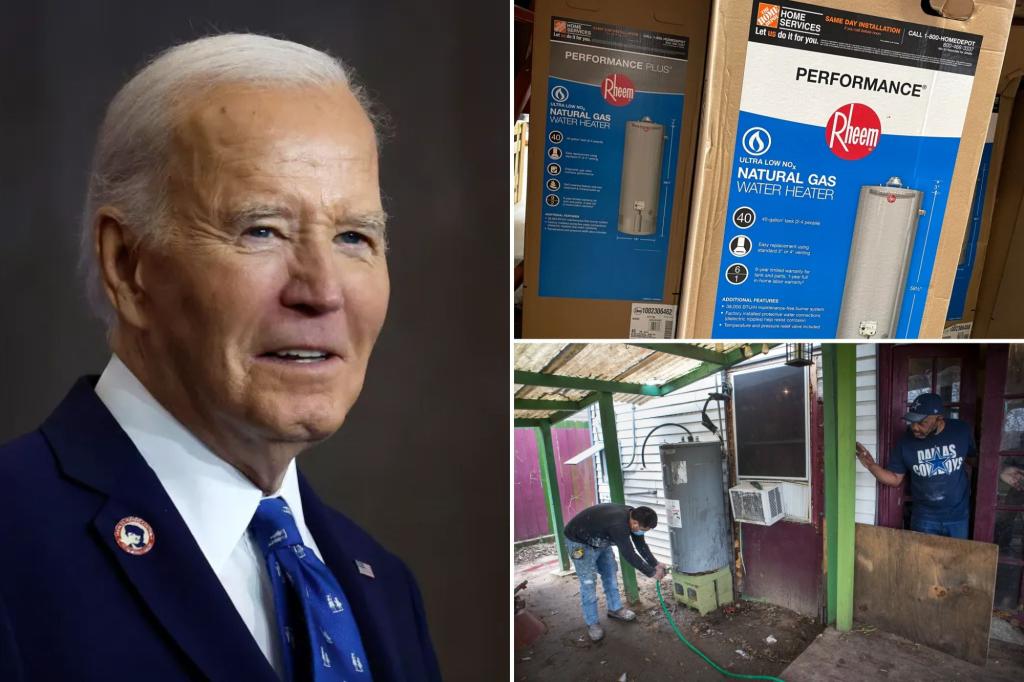We support our Publishers and Content Creators. You can view this story on their website by CLICKING HERE.

A Biden administration ban on certain natural gas water heaters as part of the lame duck president’s climate agenda could send prices soaring for the elderly and the poor.
Under the policy, new non-condensing, natural gas-fired water heaters will be prohibited for sale starting in 2029 due to concerns about carbon-dioxide emissions. The policy comes during President Biden’s twilight days in the White House and was quietly announced without a press release.
If the policy takes effect, as it is slated to on March 11, a little less than 40% of the tankless water heaters currently on the market would be banned, according to an estimate from the Appliance Standards Awareness Project.
The new rules, which were published by the Department of Energy just after Christmas, also stipulate that new tankless gas water heaters must rely on 13% less energy than the least efficient comparable model on the markets today.
While the restrictions don’t outright ban non-condensing models, only condensing models have been able to meet the new ratcheted-up energy efficiency requirements, according to the Washington Free Beacon.
“When the rule goes into effect, all that manufacturing will basically be irrelevant,” Frank Windsor, president of Rinnai America, a water heater manufacturer, told the outlet.
“A lot of the major equipment that we’ve invested in will basically have to be scrapped.”
Rinnai had just finished up a roughly $70 million factory in Georgia to produce non-condensing gas water heaters in the US.
Customers will be pushed towards buying models that are more expensive or lean on non-instantaneous storage tank water heaters, which are generally cheaper but tend to be less efficient than the ones that are facing a ban, per the report.
For example, a Rinnai America tankless non-condensing natural gas water heater goes for roughly $1,000 at Home Depot, while a comparable condensing tank goes for about $1,800.
Tankless technology is frequently used in smaller apartments or housing spaces, which means that a lot of lower-income and elderly people tend to use those types of water heaters.
“Forcing low-income and senior customers to pay far more upfront is particularly concerning. DOE’s decision to go ahead with a flawed final rule is deeply disappointing,” Matthew Agen, the American Gas Association’s chief counsel for energy, told the outlet.
By the Department of Energy’s estimate, the costs saved over the long run by the new rules will be about $112 over a roughly 20-year stretch, Agen emphasized.
“The final rule is a violation of the Energy Policy and Conservation Act (EPCA), which prohibits DOE from promulgating a standard that renders a product with a distinct performance characteristic unavailable,” he previously said.
Not everyone is up in arms about the new rules. The Appliance Standards Awareness Project cheered the development, claiming it will help reduce 32 million metric tons of carbon dioxide emissions related to water heaters over the course of about three decades.
That group had advocated for the new rules.
“This is a commonsense step that will lower total household costs while reducing planet-warming emissions,” Andrew deLaski, the firm’s executive said in a statement.
“These long-awaited standards will ensure more families save with proven energy-efficient technology already used in a majority of tankless units.”President-elect Donald Trump is set to take office on Jan. 20 and has expressed interest in reversing some of Biden’s climate change policies.
Trump has tapped Liberty Energy CEO Chris Wright to serve as his secretary of energy.

 Conservative
Conservative  Search
Search Trending
Trending Current News
Current News 





